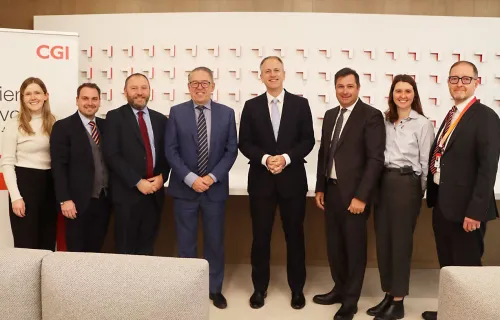How can your business encourage bold thinking while maintaining stability? What does it take to turn employees’ new ideas into smarter, scalable solutions? Listen to this episode of our 'Talking Transformation' podcast series to uncover our insights for long-lasting innovation.
Innovation doesn’t happen by chance – it’s built into an organisation’s culture.
In episode 1 of Talking Transformation, Adrian Chiffi, Victoria Waterfield, and Mike Griffiths discuss what it takes to create an environment where innovation thrives. As leaders in technology, digital workplace, and business operations, they share insights on how organisations can empower their teams to take risks, experiment, and drive meaningful change.
From fostering employee autonomy to implementing innovation governance, the conversation explores real-world challenges and strategies behind continuous innovation, uncovering key takeaways:
- Fail fast, learn fast – Encouraging risk-taking is key; employees need an environment where they feel safe to experiment and learn from failures.
- Innovation must be embedded – It’s not just for leadership; every employee should feel ownership.
- Cross-functional collaboration fuels better solutions – The best innovation happens when internal teams, alliance partners, and clients come together.
- A structured approach supports creativity – There’s a balance between governance and creative freedom that keeps innovation thriving.
- Innovation is not a one-time project – It’s an ongoing mindset and way of working.
Podcast speakers:
- Adrian Chiffi – Senior Vice President, GTO UK business unit leader, CGI
- Mike Griffiths – Director, GTO UK digital workplace leader, CGI
- Victoria Waterfield – Director, GTO UK operations, CGI
- Transcript
-
Ade Chiffi: Does the fear of failure stand as the biggest barrier to innovation? Is innovation just about those big breakthroughs or is it built on small, everyday improvements? And are we in an era where staying still is more dangerous than ever?
Hello everybody I'm Ade Chiffi. I lead global technology operations for CGI in the UK and in today's podcast I'm delighted to be joined by Vicky Waterfield, our Director of Operations, and Mike Griffiths, our leader of our digital workplace offering. Hello both.
Vicky Waterfield: Hello both. Hi everyone. Thanks for the invite today, Ade.
Ade: Now you're welcome. You're welcome. Good, great to have you on.
Mike Griffiths: Yeah. Hey, Ade. Hi, Victoria. Yeah, great to be here and looking forward to this.
Ade: Fantastic, fantastic. We'll have some fun, Mike, we're going to have some fun, Vicky. So, okay, if I was to kick off, then what we're going to be exploring is how to really look at building a culture that really does encourage innovation at every level because.
You know, innovation isn't just about that latest technology or hiring those creative minds. It has to be about how an organisation operates, how decisions are made.
And then how leaders are creating that environment, importantly, where new ideas don't just survive, but they thrive. That's what we're going to focus on and talk through. So if we look across industry, many organisations champion innovation. I'd like to think we all do.
Yet, taking risks can sometimes feel daunting for employees. True progress comes from experimentation and having that courage to experiment.
The most forward thinking organisations that we could probably all call out now, they really do create those environments where learning from setbacks is encouraged and then recognising that every step, successful or not, importantly contributes to that growth.
And you know, I would say some of the most ground breaking ideas have emerged from that continuous testing, that refinement and very, very importantly, that freedom to explore new possibilities. So, Mike, on that point, I'm going to bring you in here.
Innovation and progress they don't happen without experimentation, I would suggest.
How have we, you know, if I think about your part of the business, how we create an environment where teams feel encouraged to take those bold steps and that calculated risk like you know when you were rethinking our mod ern workplace strategy, what's your take on that?
Mike: That, yes, absolutely Ade. So I mean taking risks for us is a is a big part of driving innovation.
And you know what that means really, is that we've sort of completely rethought our modern workplace strategy. We made a bold move on this really and we decided to develop a brand new service offering that would truly transform the user experience for our clients.
If we think you know before all of this, we outsourced all of our desktop support but as the market has evolved, we've seen a real need to bring this back in house. So that shift has given us the opportunity to build a next generation AI driven modern workplace solution.
And you know, that's one that's not just cutting edge, but also deeply aligned with our CGI values.
Of course, this was a big risk for us both commercially and reputationally, and there were no guarantees that it would work. But I have to say, the response has been incredible. And you know our clients are really seeing the value in having our people with our culture and our values.
Directly supporting their teams and at the end of the day, it's all about delivering a better user experience and this decision has really allowed us to do that.
Spot on there, Mike. And I'm loving the fact that you really are focusing in on that end user lens as well in as part of that decision making. So really ties in. Vicky, I'm going to bring you in on this point, any thoughts to add there?
Vicky: Yeah, absolutely, Ade. So I think a big part of it for us is creating that environment, like Mike just explained where teams feel encouraged to take bold steps. It's the visibility of what we're doing. It's not just celebrating the successes, but it's about making visible all the things we're doing with our wider business, so, sharing when things don't go quite as we might have planned.
I think by making our risks and our learnings transparent across the rise of business, we really do reinforce that innovation isn't about getting it right first time, but it's really about experimenting, adapting and improving as we go.
The openness that then creates is a culture where people feel safe to take calculated risks because they know their efforts are valued, whether they lead to immediate successes, or really valuable lessons learnt for the future. It really does create an environment where they know they'll be supported either way.
And ultimately, the more we embrace this approach to innovation the greater the benefit for all of our stakeholders, whether that’s our clients, who gain access to cutting edge solutions or our CGI partners who have the opportunity to build meaningful careers whilst working with new really exciting technologies. By continuously sharing those experiences we're really fostering an environment where innovation thrives; is it's not just an idea but it's a fundamental part of how we operate.
Ade: Exactly that, Vicky, and it is that lab mentality almost that allows us to fail fast, learn fast - and really look to move forward with even stronger solutions is the likely outcome, so.
Vicky: Totally.
Ade: I'm hearing we don't see failure as a roadblock; we see it as a stepping stone to innovation, importantly. And then, that lens, you know, really does allow our teams to drive that innovation across the business. So, folks, we're starting to see that innovation doesn't happen in isolation at the top, it's it happens when employees across all levels feel that ownership, importantly, of new ideas and then have that autonomy to act on them. Vicky, we talk a lot then, taking that theme, about making innovation part of everyone's role, not just a top down initiative that we're driving.
How are we ensuring our teams feel properly equipped and empowered to own that innovation?
Vicky: Yeah, you're right Ade. We do talk about this a lot. And I think that's because we are really intentional about making innovation part of everybody’s role, as you say, it's not a thing that happens at the top; it needs to be something that happens, and is the responsibility of every single CGI partner in our business.
So, for us innovation, it isn't a thing, it it's a culture, It's a way of operating, a mindset, I suppose, it's about encouraging curiosity that drives that continuous improvement.
I think it's also about the language we use every day, so really ensuring our CGI partners feel safe to explore, new ideas, to ask curious questions and to drive innovations for themselves. However big or small they may be.
So one of the things we've done to support our teams, to feel empowered in this space is to implement an innovation governance process.
And I know a governance process might sound counterproductive to innovation, but our process really gives our team a really flexible way of bringing forward new ideas, gaining that buy-in they need from the wider business and getting support from leaders across all of our business disciplines. So, what's been really important for us is putting in place a process that doesn't stifle creativity, but actually instead creates that transparency; creates that momentum that ensures that great ideas from all areas of our business don't get lost, but are instead nurtured, redefined with the support of our experts. And as well as this, you know, we've also considered having a transformation engine. So, that's the bit of the puzzle that fits into after the innovation process - that's the bit that plays a crucial role in making sure the best innovations, those that we invest in and we take forward.
You know, we bring those to the rest of the business. They're rapidly shared across the rest of our business internally, but also with our client base. So, making sure that the transformation team are able to support us to deliver the best solutions at pace, maximising the impact of our innovations across the board. And I think ultimately, our innovation process and our approach is about balance. It's about giving teams structure, giving them support they need, but also keeping the freedom to think big - to experiment, and that's really what keeps innovations thriving across our business.
Ade: I'm hearing that and I'm seeing it as well. It's, you know, some of the benefits that some of the biggest benefits that we've seen, Vicky and Mike, fair to say, have been where innovation is truly embedded into the culture rather than treating it as a one-off initiative and what you know what I've seen that create is a real sense of ownership, where teams aren't just waiting for innovation to come, they're actively bringing forward ideas.
Knowing importantly that they have a clear path to test, refine, and implement them, they get that ownership to take it on and see the outcomes of that effort that they can share.
I would probably call on another major impact and that's been around cross-functional collaboration. So, multiple teams working together, including the client as well, you mentioned the client just now, Vicki, we see that as well in part of the way we innovate, that governance process does bring together people from all disciplines and all teams, so innovation is no longer then confined to one area of the business, which allows it to be - I think you used the word Mike, ‘holistic’, you know and well supported and really more impactful, that's when it really does make a difference and we have that opportunity to be first through the wall, so to speak, and make that significant difference.
Now, what I've seen this lead to is faster decision making. The opportunity to drive smarter solutions and importantly, innovations that can scale more effectively across our across our client base and across our across our team.
Mike, if we take this one step further then and you know very focused on that collaboration piece.
You know, I know that's been at the heart of what you've been developing in the digital workplace proposition. I'd like to share just a couple of different angles on how that's really come together, bringing in multiple teams.
Mike: Yeah, absolutely. Ade, I mean this is something it has quite close to my heart and quite an exciting topic for me. So, collaboration for us really across multiple teams has been absolutely key in shaping our modern workplace offering. I've got a really good example of this in it’s how we worked with our AI OPS team to integrate our smart locker solution, with both ServiceNow and Next Thing.
What this means is in practise we can now automate and proactively resolve hardware issues, and quite often this is even before the user realises there's a problem. So it's about sort of combining expertise from different teams and with these teams we've built a seamless, intelligent solution, that not only improves efficiency, but once again to go back to our user experience, you know this makes a huge difference to that user experience and you know this shows really how we're breaking down silos and working together to really drive innovation, especially in this area.
Ade: Totally, Mike, you know you're breaking down those silos and really looking to drive out that innovation.
Mike, Vicky, thank you so much for your time over the last 10-15 minutes. I'm going to attempt to recap - and please come in wherever you feel on this.
What I've heard of three key areas that we really need to focus on when thinking about continuous innovation, the first one and I've heard that really focusing in on encouraging risk taking and learning from failure. None of us own the book on being right. We need to be open to multiple views and ways of working.
Secondly, I've heard from both of you and I completely agree with this myself. Empowering teams to own that innovation, so reducing bureaucracy and really giving our folk across the board that autonomy to drive change.
Mike: Yeah, totally. Ade. And what that also means is for our, for our partners at CGI here, it gives them that exciting sort of innovative career. You know, they've got the opportunity to shape what we're doing in this area.
Ade: Spot on Mike, and then the third key area is really around fostering that cross functional collaboration, so driving diverse perspectives across multiple teams to really solve those. Those biggest challenges Vicky, on number three there, I know you're particularly passionate about this, What's your take on that?
Vicky: Absolutely. It's that wider ecosystem bringing everyone in, whether that's our CGI partners who are delivering for our clients day in day out, whether that's our leaders or our experts or actually our clients themselves. You know, understanding what it's like to live a day in their lives, or actually our alliance partners. As Mike's mentioned, you know bringing them in to deliver those innovations and to be market leading it, it's about bringing all those people together to really drive this forward.
Ade: Vicky, I couldn't agree more. OK, we're just about at the end now. I wanted to share one more line that, you know, I've really heard it throughout today and that is that innovation isn't a one-time project; For it to truly stick, it has to be a mindset and a way of working together, and being comfortable that we can learn from every single opportunity, and keep moving forward together.
So, Mike, Vicki, thank you so much. I've really enjoyed spending a bit of time with you today.
Hopefully, you enjoyed that yourselves.
Vicky: Yeah, definitely. Thanks Ade.
Mike: Yeah, thanks Ade, really good.
Ade: Fantastic. It is a big topic and I and I really do hope that this has given our listeners some food for thought. Please, please, please reach out to us to discuss any of these areas further. And don't forget you can listen to all our experienced CGI podcasts wherever you access them.
Thank you so much for taking the time to listen us today. Have a great rest of the day.
[END OF AUDIO]
Listen to learn from our team’s real-world experiences, and to find out more about some of the topics discussed:
Explore our digital workplace offerings
Explore our Digital Backbone approach for outcomes-focused transformation




